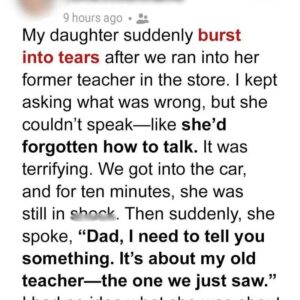My first grandson was born six months ago, but I wasn’t allowed to meet him. My daughter-in-law always said,
“I’m just not ready for visitors.”
Yet her own mother had practically moved in.
Each day that passed made my heart ache. I offered to drop off meals. I suggested a quick video call. I was gentle, respectful—but always turned away.
My son barely returned my calls. And when he did, he sounded strained.
“Mom, please, just give us more time,”
he’d say. But six months felt like a lifetime.
Last night, I couldn’t take it anymore. I baked cinnamon rolls, wrapped them in a towel, and drove to their house. The lights were on. Music played softly. My hands shook as I rang the bell.
When my son opened the door, he froze. My daughter-in-law stood behind him, clutching a dish towel like a shield. They looked like they’d seen a ghost.
I stepped inside before they could protest—and that’s when I saw them. Not one baby. Two. Twins.
One cooed in a playpen. The other rolled on the floor, rattling a toy. Identical in every way. My mind went blank.
Why didn’t they tell me?
My daughter-in-law’s voice trembled as she explained.
“They were born premature. I almost died. One of them was in the NICU for weeks. I was terrified. I couldn’t handle the questions, the pressure, the judgment. I didn’t even want to tell people about the twins.”
I stood there stunned, heart torn between hurt and concern.
“But why not tell me?”
My son stepped forward, looking older than his years.
“We thought we were protecting you. We didn’t want you worrying every day.”
I looked at the babies. One giggled as he grabbed my finger. My heart melted. Their soft curls, round cheeks, and perfect button noses… they were breathtaking.
“You could have told me,”
I whispered, eyes brimming.
My daughter-in-law nodded.
“I know. But I was scared. I didn’t know how to let people in.”
She told me everything—how she almost lost her life, how fear and postpartum anxiety ruled her days. Her mother had moved in to help, but even that felt like too much sometimes.
“I thought you’d think I was a bad mother,”
she said.
“Needing help doesn’t make you a bad mother,”
I told her gently.
“It makes you human.”
That night, I offered to stay so they could rest. She hesitated, eyes still raw.
“I want you here… I just don’t know if I can handle it yet.”
We compromised: I’d come by each morning to help.
At first, she stayed upstairs while I fed and changed the twins. Then she began lingering over coffee, sharing little stories about their different personalities. One loved to snuggle. The other kicked like a frog. We were beginning to trust each other.
Then one morning, she got a call—her mother had fallen. She had to leave immediately. My son was at work.
“Can you stay with them?”
she asked, panicked.
I agreed. Alone with my grandsons, I fed them, rocked them, and sang lullabies I used to sing to their father. When she returned, she stared at me with something close to awe.
“I don’t know how we ever got by without you.”
From that day on, I became their steady rhythm. I watched my son and daughter-in-law grow stronger, even through tension and tiredness.
One day, I overheard them arguing—over work, exhaustion, missing milestones. Their marriage was fraying. I sat them down in the kitchen and shared a truth from my own marriage:
“Resentment grows in silence. Find ten minutes a day to talk. No phones. Just you two.”
It wasn’t magic, but it worked. I saw them start holding hands again. Laughing. The house felt lighter.
Then one day, my daughter-in-law asked me something I never expected.
“Would you move in with us for a while?”
She smiled.
“You’re the heart of this house.”
I said yes.
We rearranged the guest room, and I moved in. I was there for their first steps, their first words, their late-night cries. I was no longer the grandma kept outside—I was part of their home.
Months later, at their first birthday party, my daughter-in-law raised her glass.
“To the woman who never gave up on us. Thank you for being patient, for forgiving us, and for loving our boys with your whole heart.”
I wept.
Looking back, I realize I almost let bitterness keep me from something beautiful. But love—real love—is persistent. Sometimes people shut you out not because they don’t care, but because they’re overwhelmed.
Don’t give up on the people you love. Keep showing up, even quietly. Because one day, that closed door might swing open.
And behind it, you may find more love than you ever imagined.





